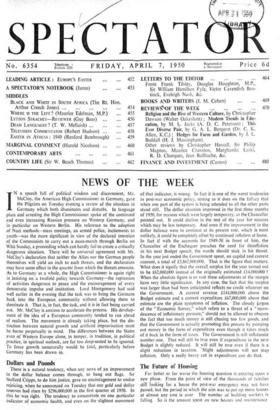Dollars and Pounds
There is a natural tendency, when any news of an improvement in the dollar balance comes through, to hang out flags. Sir -Stafford Cripps, to do him justice, gave no encouragement to undue rejoicing, when he announced on Tuesday that our gold and dollar reserves had risen by $296,000,000 in the first quarter of 1950. In this he was right. The tendency to concentrate on one particular indicator of economic health, and even on the slightest movement of that indicator, is wrong. In fact it is one of the worst tendencies in post-war economic policy, resting as it does on the fallacy that when one part of the system is being attended to all the other parts stand still. The dollar situation improved in the first three months of 1950, for reasons which were largely temporary, as the Chancellor pointed out. It could decline in the rest of the year for reasons which may be less temporary. And even if the improvement in the dollar balance were to continue at its present rate, which is most unlikely, it could be completely offset by continued inflation at home. In fact if with the accounts for 1949-50 in front of him, the Chancellor of the Exchequer preaches the need for disinflation in his next Budget speech, the words should stick in his throat. In the year just ended the Government spent, on capital and current account, a total of £3,862,000,000. That is the figure that matters. What does it signify that the overall surplus for the year turned out to be £62,000,000 instead of the originally estimated £14,000,000? When the absolute figure is so vast these adjustments at the margin have very little significance. In any case, the fact that the surplus was larger than had been anticipated reflects no credit whatever on the Government. A current revenue £144,000,000 above the Budget estimate and a current expenditure £67,000,000 above that estimate are the plain symptoms of inflation. The cloudy jargon of the "Economic Survey," which refers to a threat of a " recru- descence of inflationary pressure," should not be allowed to obscure the fact that too much money is still chasing too few goods, and that the Government is actually promoting this process by pumping out money in the form of expenditure even though it takes much of it back in the form of taxes. The Government is still inflationist number one. That will still be true even if expenditure in the next Budget is slightly reduced. It will still be true even if there is a slight reduction in taxation. Slight adjustments will not stop inflation. Only a really heavy cut in expenditure can do that.






































